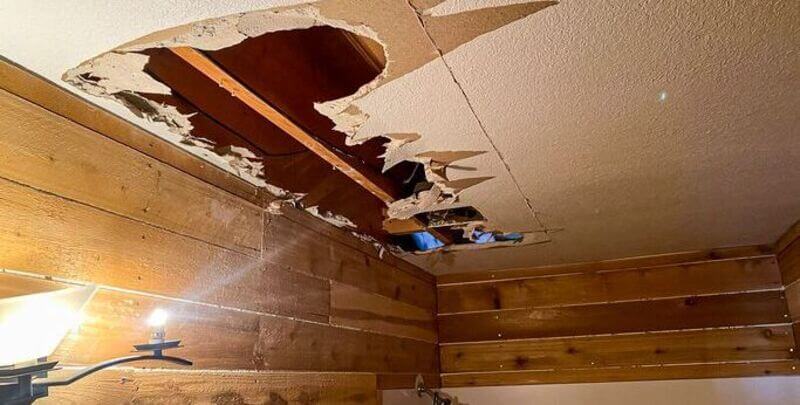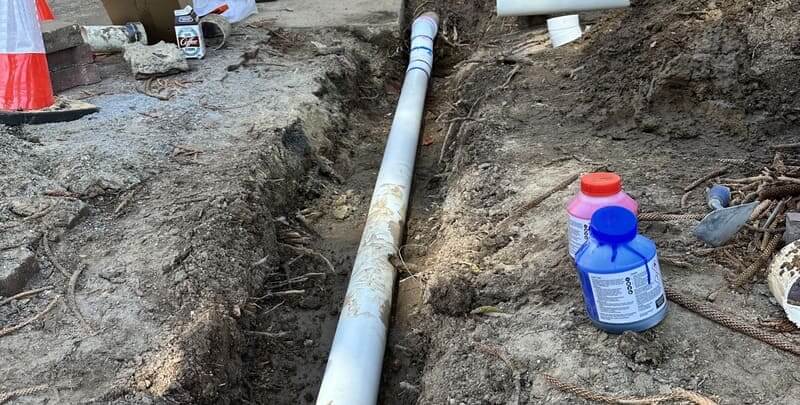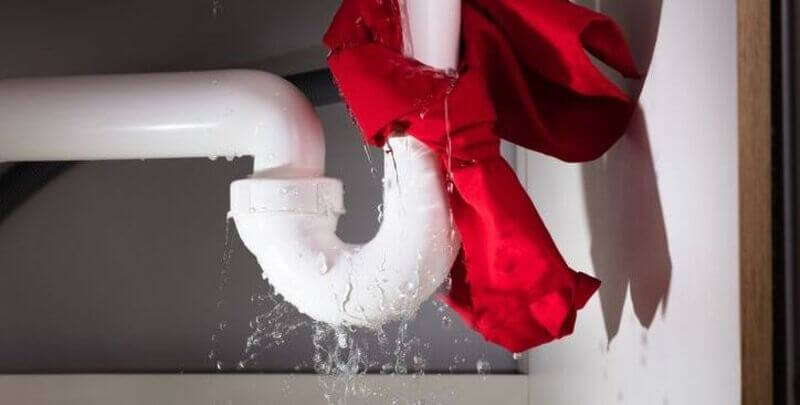
Burst Pipe Water Damage: 5 Surprising Types of Damage to Watch For
Water damage from burst pipes can wreak havoc on homes and buildings, causing unexpected and often surprising harm.
It’s a scenario that requires immediate attention and understanding.
Burst pipe water damage isn’t just about mopping up the mess of water coming from eventually bursting up; it involves dealing with water bills and various types of damage that might catch you off guard.
Identifying and promptly addressing a burst water main or pipe damage is crucial for water flow, preserving the aesthetic appeal of your property and ensuring the safety of its structure and occupants.
Types of Burst Pipe Water Damage
Before we get to all the reasons that pipes burst and what to do about it, let’s take a detailed look at those five surprising types of damage.
1. Structural Damage to Your Home
When pipes burst, they unleash a torrent of water that can compromise your home’s foundations. The force and volume of water can weaken walls, ceilings, and floors.
Over time, this structural damage can escalate, leading to cracks, sagging, or even collapse.
It’s not just about fixing or leaking the leak; it’s about safeguarding the core stability of your house and living space.
If you notice water stains, warped surfaces, or unusual creaking sounds, it’s time to promptly investigate and address potential structural damage.
2. Mould and Mildew Growth
Water damage creates stagnant water, the perfect breeding ground for mould and mildew.
The damp and humid environment that follows a burst water pipe incident is an open invitation for these unwanted guests.
Mould not only damages surfaces but also poses health risks to occupants.
Respiratory issues, allergies, and skin irritation are just a few of the problems associated with mould exposure. To prevent mould growth, act swiftly.
Dry affected areas thoroughly, use dehumidifiers and consider mould-resistant materials when renovating.

3. Electrical Damage
Water and electricity don’t mix well; burst water pipes can bring these elements into a dangerous dance. Electrical systems exposed to water face the risk of short circuits, malfunctions, or even fires.
If water damage has reached electrical components, it’s crucial to prioritise professional assessment and repairs.
Don’t attempt to handle electrical or plumbing issues, as it poses a severe safety hazard. Ensure that power is turned off in affected areas and seek the expertise of a qualified electrician to assess and rectify any remaining water damage.
4. Damaged Personal Belongings
Beyond the structural and health implications, water damage can also affect personal possessions. Furniture, electronics, sentimental items – all are susceptible to the destructive power of water. Salvaging and restoring these items require a systematic approach.
Remove items from affected areas promptly, gently dry them, and assess the extent of the damage as soon as possible.
Professional restoration services may be necessary depending on the material and severity of the exposure. Quick action increases the chances of salvaging cherished belongings.
5. Foundation Issues
Water from damaged pipes, when left unchecked, can seep into the foundation of your home, leading to a host of problems.
Foundation water dripping issues might not be immediately apparent, but you could notice cracks in the walls, uneven floors, or doors and windows that no longer close correctly over time.
Mitigating foundation water leak issues involves addressing the source of water damage, ensuring proper drainage around your property, and, in severe cases, consulting with a structural engineer for comprehensive solutions.
Eight Reasons That Pipes Burst
Burst or broken water pipes can be a homeowner’s nightmare, causing significant damage to property and requiring costly repairs.
Understanding the reasons behind burst water pooling pipes is crucial for taking preventive measures.
Here are eight of the common reasons for burst or leaking, burst or water pipes and damage:
1. Freezing Temperatures
Frozen water within pipes is a leading cause of bursts in colder climates. When water freezes, it expands, putting immense pressure on the pipe walls.
This pressure can eventually lead to the pipe bursting. Pipes in unheated areas or those inadequately insulated are particularly vulnerable.
2. Age and Corrosion
Over time, pipes can corrode or deteriorate due to age. Older pipes made of materials like galvanised steel are especially prone to corrosion.
As pipes corrode, they become weakened and more susceptible to bursting, potentially causing extensive water damage.

3. High Water Pressure
Excessively high water pressure can strain pipes beyond their intended limits, leading to ruptures. It may occur if the municipal water supply has elevated pressure or the home’s pressure regulation system malfunctions.
Regularly checking and adjusting water pressure can help prevent this issue.
4. Tree Roots
Tree roots seeking moisture can infiltrate and damage underground pipes. As roots grow, they pressure the pipe walls, causing cracks or ruptures.
Regularly inspecting pipes, especially those near trees, can help identify potential root intrusion before it leads to a burst.
5. Poor Pipe Installation
Improperly installed pipes are more prone to leaks and bursts. Issues such as inadequate support, incorrect material selection, or subpar workmanship can contribute to the premature failure of pipes.
Ensuring professional installation and periodic inspections can mitigate this risk.
6. Corrosive Water Quality
Water with high acidity or mineral content can accelerate pipe corrosion, weakening walls and eventual bursts.
Water quality testing and, if necessary, installing water treatment systems can help protect pipes from the corrosive effects of specific water compositions.
7. Physical Damage
Accidental or intentional physical damage to pipes can result in bursts. It may include damage from construction activities, excavation, or even impact from heavy objects.
Awareness of the location of pipes and taking precautions during any work around them can prevent such incidents.
8. Clogs and Blockages
Accumulation of debris, grease, or mineral deposits within pipes can lead to blockages. As water flow is restricted, pressure builds up, increasing the risk of bursts.
Regular maintenance, including pipe cleaning and drain clearing, can prevent clogs and alleviate pressure.
Understanding these reasons for burst pipes allows homeowners to take proactive measures to minimise the risk of burst water pipes again. Regular inspections, proper insulation, and promptly addressing issues can help safeguard pipes and prevent the potential damage associated with burst pipes.
The Importance of Addressing Burst Pipes
Addressing burst pipe damage is crucial for several reasons, as it can have significant consequences for both property and personal well-being.
Here are some key reasons highlighting the importance of promptly addressing burst pipe damage:
- Preventing water damage: Burst pipes can release a large volume of water rapidly, leading to extensive water damage to walls, ceilings, floors, and possessions. Water damage can compromise the structural integrity of a building, promote mould growth, and damage valuable belongings.
- Mould prevention: Excess moisture from burst pipes creates an ideal environment for mould growth. Mould can start developing within 24 to 48 hours in damp conditions. Promptly addressing burst pipes helps prevent the growth of mould, which can be hazardous to health and require costly remediation.
- Protecting possessions: Water damage can ruin furniture, electronics, documents, and other personal belongings. Quick action can help salvage items and reduce the overall financial and emotional impact on homeowners.
- Preserving structural integrity: Water damage can weaken the structural components of a building, including walls, ceilings, and floors. Over time, this can lead to structural problems, compromising the safety and stability of the property. Timely repairs can prevent long-term structural issues.
- Avoiding secondary damage: If not addressed promptly, burst pipe damage can lead to secondary issues such as electrical problems, damaged insulation, and compromised heating, ventilation, and air conditioning systems. Addressing the initial damage promptly can prevent these secondary issues from occurring.
In summary, addressing burst pipe damage promptly is crucial to prevent further damage, protect personal belongings, ensure structural integrity, and maintain a safe and healthy living environment. It can also help minimise the financial impact and ensure compliance with insurance requirements.

How Professionals Fix Burst Pipes
However, seeking professional plumbing services is crucial for effectively and efficiently resolving plumbing problems when faced with burst or blocked water pipes.
Here’s how professional plumbing companies can help fix burst or blocked pipes:
- Emergency response: Professional plumbing companies often provide 24/7 emergency services. They understand the urgency of burst pipe situations and can respond promptly to minimise water damage. Immediate action is crucial to prevent further complications.
- Pipe inspection: Professionals use advanced tools and techniques for thorough pipe inspection. It may involve cameras to identify the location and extent of the burst. Accurate diagnostics enable them to develop a targeted and effective repair strategy.
- Isolation of the problem: Before initiating repairs, professionals will isolate the affected section of the plumbing system. It may involve shutting off the water supply to the damaged area while leaving the rest of the system operational. It minimises disruption to your water service during repairs.
- Water extraction: Professionals have the equipment to extract water efficiently if there’s significant water damage. It helps prevent secondary issues such as mould growth and structural damage. The use of industrial-grade pumps and vacuums ensures thorough water removal.
- Pipe repair or replacement: Depending on the severity of the pipe damage, professionals will recommend either repair or replacement. They have the expertise to assess the condition of the pipes and determine the most cost-effective and durable solution. Professionals may apply temporary fixes if a complete replacement is not immediately possible.
- Quality materials and tools: Professional plumbing companies use high-quality materials and tools for repairs. It ensures the longevity and reliability of the fixes. Using durable materials also reduces the likelihood of future issues related to the repaired or replaced pipes.
Engaging the services of a professional plumbing company ensures that burst pipe and plumbing issues are addressed comprehensively, minimising the impact on your property.
From immediate emergency response to long-term prevention strategies, eventually burst and plumbing work, these professionals bring expertise and reliability.
Consider Regular Plumbing Inspections
In conclusion, burst pipe water damage encompasses more than meets the eye. From structural compromises to health hazards, it’s a multifaceted challenge that demands swift and comprehensive action.
As we’ve explored five of the surprising types of burst water pipe damage, it’s evident that immediate attention and professional assistance are paramount.
To prevent future incidents, consider regular plumbing inspections, insulating pipes in colder climates, and educating yourself on early warning signs of damaged pipe and burst pipe water damage.
By staying vigilant and proactive, you can protect your property from the unexpected consequences of burst pipe water damage.
Please note: This information is provided for advice purposes only. Regulations differ from state to state, so please consult your local authorities or an industry professional before proceeding with any work. See our Terms & Conditions here.